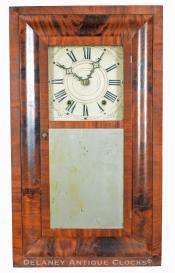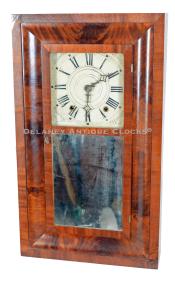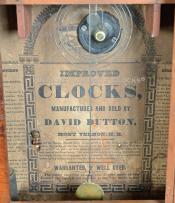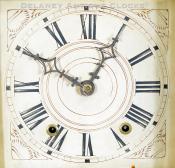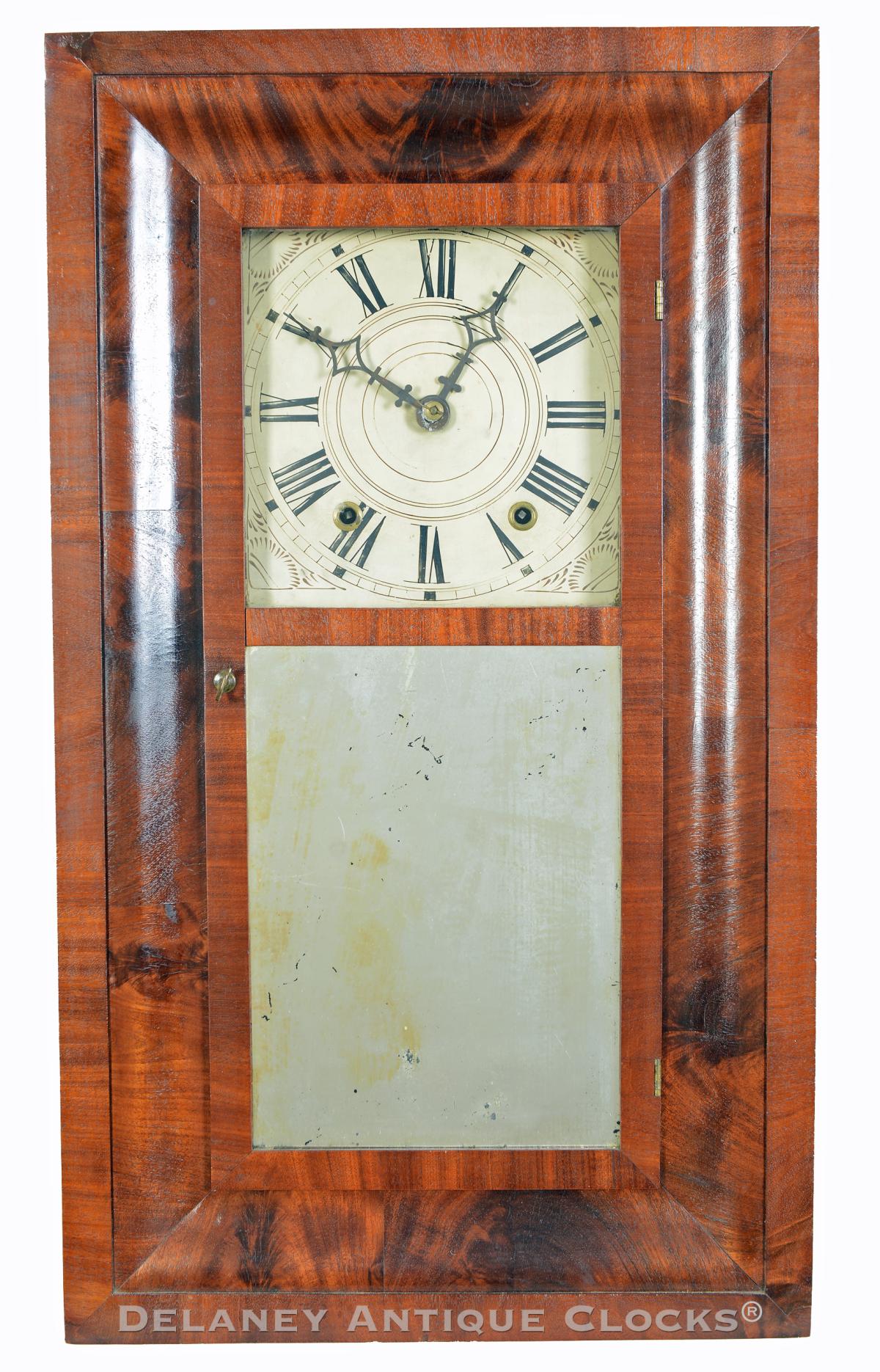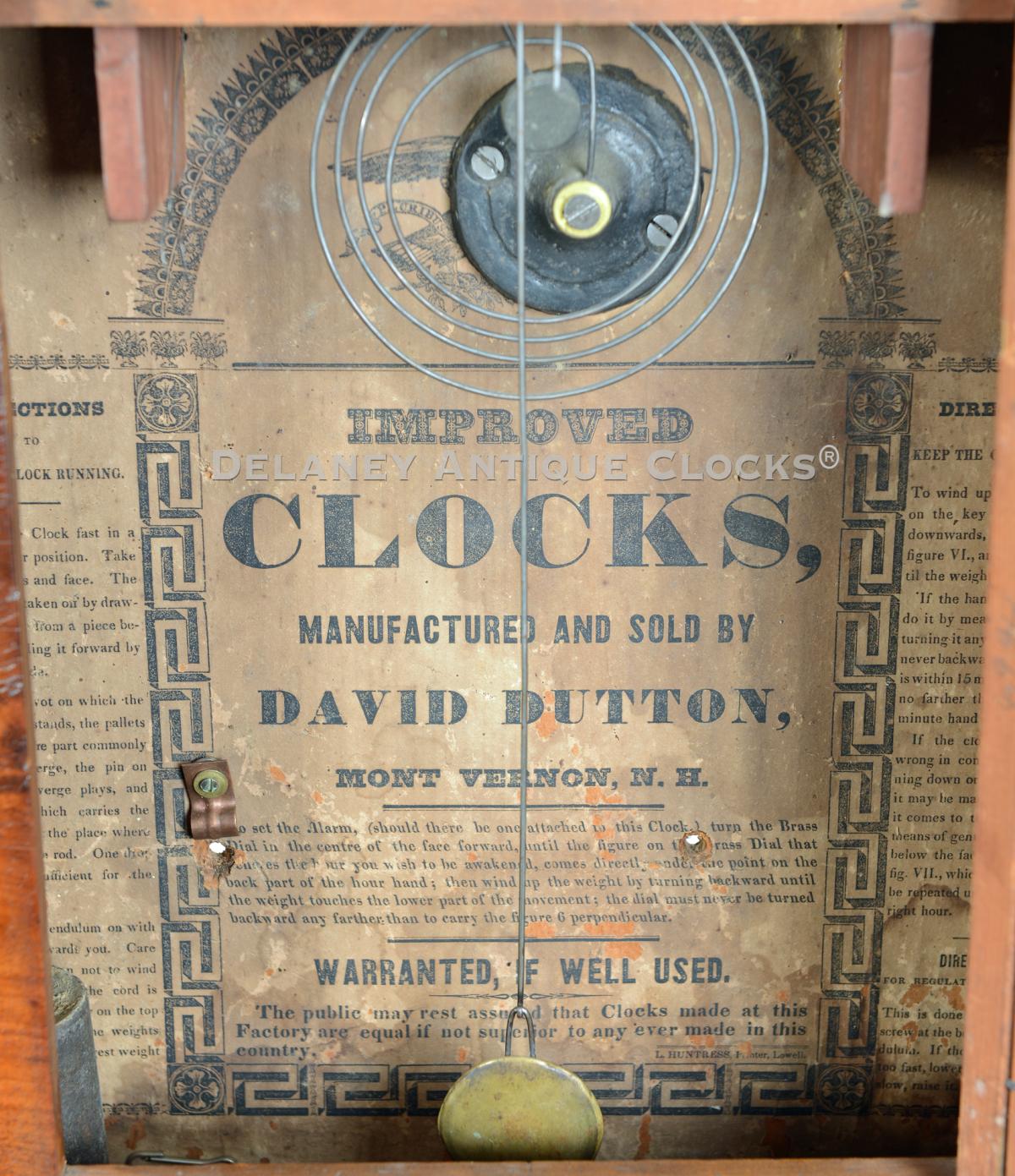David Dutton, Mount Vernon, New Hampshire. 30-hour Ogee shelf clock. 224064.
This is a rare and very collectible Ogee-cased shelf clock with a pasted label of David Dutton, Mount Vernon, NH.
The case is constructed of white pine and veneered with mahogany. The veneers are in excellent condition and richly grained. The original finish has mellowed and is now a subtle, pleasing color. It has been lovingly rubbed out and cared for over the years.
The wooden dial is nicely paint-decorated. The decorations lack a gesso base. They are simply formed. The minute ring is closed. The hour numerals are depicted in a Roman style.
The weight-driven movement is wooden-geared and designed to operate for thirty hours on a full wind. Two rectangular-shaped wooden plates support the steel pinions, wooden arbors, and wooden gearing. The strike train features a count-wheel system. It will strike each hour on a coil wire gong mounted to the backboard inside the case.
The pasted label is very nicely detailed. It was printed by L. Huntress, Printer, Lowell. The label features a classical-shaped facade. A Greek-key foundation supports the fancy arch. The E.Pluribus Unum patriotic banner features an American eagle within the arch. The eagle is depicted with its wings outstretched, claws clutching arrows, an American shield, and holly branches. Below is the company advertisement. “IMPROVED / CLOCKS, / MANUFACTURED AND SOLD BY / DAVID DUTTON, / MOUNT VERNON, NH.” Below this are the directions for setting up and operating the alarm, which this clock does not have. The clock's directions are written on the sides of the label.
The case measures 26.25 inches tall, 16.25 inches wide, and 5 inches deep.
This clock was made circa 1838.
Inventory number 224064.
David Dutton was born on April 22, 1792, in Wilton, New Hampshire. His parents were Jacob and Rhoda (Dix) Dutton. David married Delinda Saunders of Brookline on December 5, 1813. They had at least three children. The Duttons moved to Mt Vernon before 1814. In his early life, David worked with leather, advertising as a shoemaker and harness maker. He placed several ads in the Amherst, NH, newspaper, The Cabinet. On February 14, 1814, an ad was placed to rent his Shoemaker's Shop in Mount Vernon. On July 10, 1824, he advertised for a journeyman with good saddle and harness-making skills. In 1825, he placed an ad in The Cabinet for someone to rent out his Sadler's Shop for a couple of years. A year later, 1826, this shop was occupied by Hiram Nichols, who performed saddle, harness & trunk making there.
From leather goods to organs, David may have rented his shop to pursue the manufacturing of church and parlor organs. This endeavor may have lasted only seven years. He placed an ad on March 29, 1833, stating that he had closed his organ business and wanted to sell his last four new and superior tuned organs at auction. Their values ranged from $100 to $600. He also mentions that he had five used organs to sell at the same sale. One Dutton organ survives and is currently in the National Music Museum in South Dakota. The front board is signed, "D. Dutton / Mt. Vernon, NH. / Patent."
Dutton soon became New Hampshire's most productive clockmaker. He often sourced movements from Connecticut firms, including Boardman & Wells. Many of his cases were built by John Carleton. Clocks have been found with Carlton's name written inside, identifying him as the casemaker.
Charlie Parsons recorded 13 case variations in Dutton clocks and five label variations; some of these were printed in Amherst, NH.
In 1852, David advertised from Mt Vernon that he was a Harness maker and would repair harnesses and clocks from his new shop above J.H. Richardson's store fronting Beard & Baker's new Hall.
David Dutton died in West Medford, MA, on April 22, 1882.

